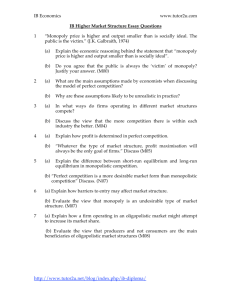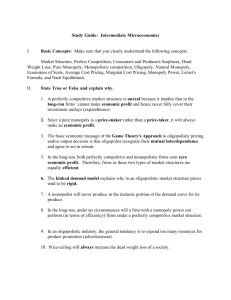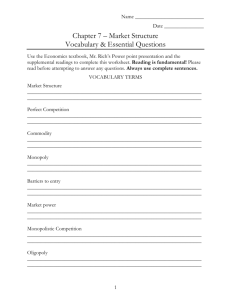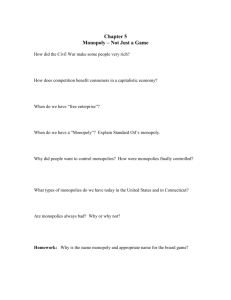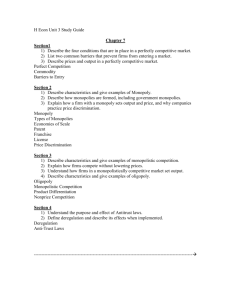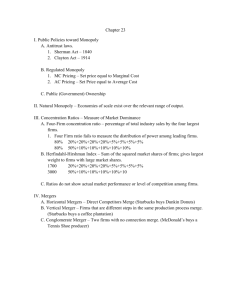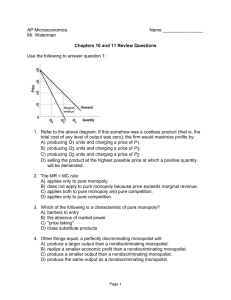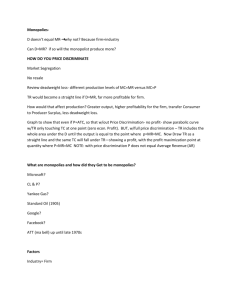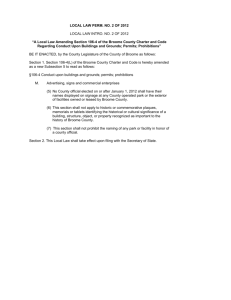2A Task 4 Market failure and government policies
advertisement
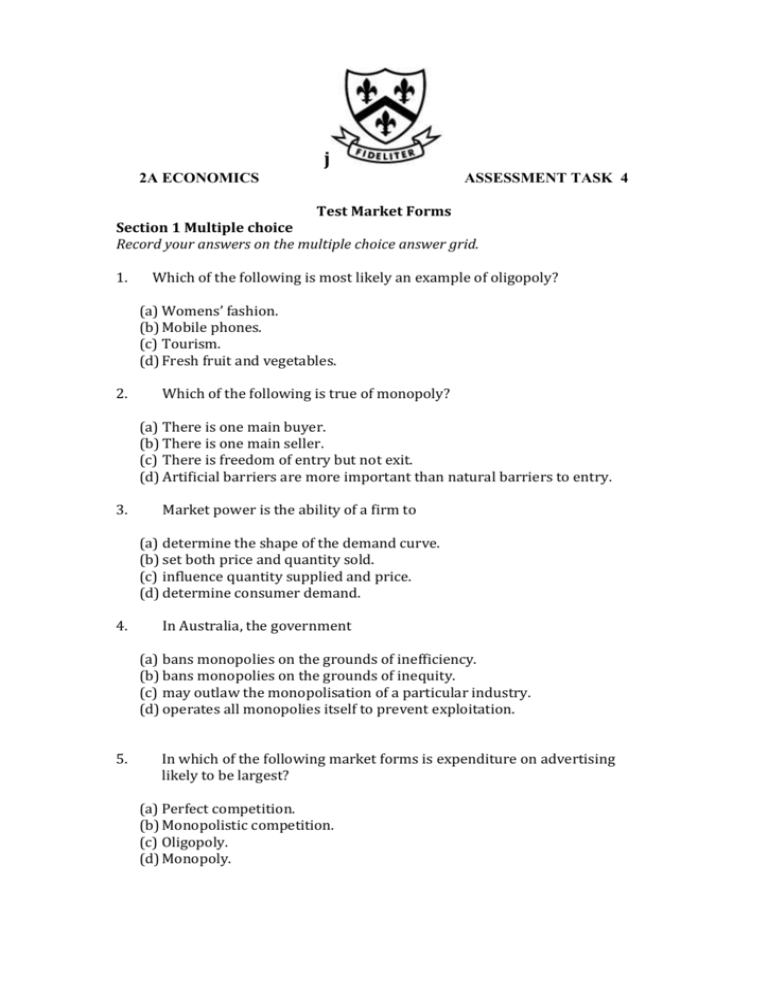
j 2A ECONOMICS ASSESSMENT TASK 4 Test Market Forms Section 1 Multiple choice Record your answers on the multiple choice answer grid. 1. Which of the following is most likely an example of oligopoly? (a) Womens’ fashion. (b) Mobile phones. (c) Tourism. (d) Fresh fruit and vegetables. 2. Which of the following is true of monopoly? (a) There is one main buyer. (b) There is one main seller. (c) There is freedom of entry but not exit. (d) Artificial barriers are more important than natural barriers to entry. 3. Market power is the ability of a firm to (a) determine the shape of the demand curve. (b) set both price and quantity sold. (c) influence quantity supplied and price. (d) determine consumer demand. 4. In Australia, the government (a) bans monopolies on the grounds of inefficiency. (b) bans monopolies on the grounds of inequity. (c) may outlaw the monopolisation of a particular industry. (d) operates all monopolies itself to prevent exploitation. 5. In which of the following market forms is expenditure on advertising likely to be largest? (a) Perfect competition. (b) Monopolistic competition. (c) Oligopoly. (d) Monopoly. Question 6 refers to the following diagram that shows the demand curve facing an individual firm in a market. 6. This firm operates in (a) a perfectly competitive market. (b) a monopolistically competitive market. (c) an oligopolistic market. (d) a monopoly market. 7. A monopolistically competitive firm possesses (a) no control over price because all firms have a small share of the total market so all firms are price takers. (b) some control over price because product differentiation has convinced buyers that there is a difference between the output of different firms in the market. (c) quite a lot of price control because long established firms have been able to gain brand loyalty from their customers who may be unresponsive to price change. (d) total control over price because each firm is in effect a monopolist with respect to their own brand of the product. 8. The prisoner’s dilemma illustrates that (a) mutual understanding ensures cooperation in an oligopolistic market. (b) competition ensures cooperation in an oligopolistic market. (c) cooperation is difficult to achieve in an oligopolistic market. (d) oligopolists always make poor decisions. 9. Economists believe that monopoly power creates a misallocation of resources because (a) there is only one seller in a monopoly. (b) monopolists seek to exploit consumers. (c) there is too little output at too high a cost. (d) monopolists can set both price and quantity sold. 10. A natural monopoly may arise (a) where there are many natural entry barriers. (b) where there is a small market and very high start up costs. (c) in markets for natural resources such as coal. (d) when the government decides to produce a product to ensure equity. 11. The concept of the kinked demand curve is based on the assumption that oligopolistic firms believe (a) a price rise will not be followed by other firms. (b) a price fall will not be followed by others. (c) firms will remain stable. (d) collusion is the best strategy. 12. A monopolist, engaging in complete price discrimination, could (a) charge different prices to different segments of the market. (b) charge the same excessive price to all buyers. (c) eliminate consumer surplus. (d) eliminate producer surplus. NAME: ___________________________________ 2A ECONOMICS ASSESSMENT TASK 4 Record your answers to the multiple choice in the spaces below. 1 2 3 4 5 6 7 8 9 10 11 12 SECTION 2 DATA INTERPRETATION Read the newspaper article below and answer the questions that follow. SUN WON’T SET ON BITTER CABLE BEACH CAMEL WAR A train of camels, carrying holidaymakers along beautiful Cable beach in Broome at sunset, has become the international calling card on the Kimberley tourism mecca. But behind the picture of tranquillity rages a bitter battle for control of the multi million dollar industry. This week three of the four camel companies, including that of industry founder Abdul Casley were outgunned by new kid on the block John Geappen when Broome Shire Council made Mr Geappen’s Red Sun Camels the sole operator. Mr Geappen will pay $100 000 a year for each of the available permits and provide Council rangers with two, new four wheel drive vehicles for beach patrols over the life of the contract. He must also provide bank guarantees of $300 000 in case he goes broke. Compare that with the $500 a year that camel companies used to pay for permits and its easy to see how Mr Geappen was able to blow the competition out of the water. All three operators believe the decision should be investigated by the ACCC and a ruling made on whether the decision breaches the provisions of the TPA. (Taylor, R. (2006) Sun Won’t Set on Bitter Cable Beach Camel War) The West Australian August 2008. (a) Identify and define the type of market structure established by the awarding of all three licences to Red Sun Camels. (2) _____________________________________________________________________________________________ _____________________________________________________________________________________________ _____________________________________________________________________________________________ _____________________________________________________________________________________________ _____________________________________________________________________________________________ _____________________________________________________________________________________________ (b) Describe two entry barriers to the Camel Ride Industry in Broome and classify them as either natural or artificial. (4) _____________________________________________________________________________________________ _____________________________________________________________________________________________ _____________________________________________________________________________________________ _____________________________________________________________________________________________ _____________________________________________________________________________________________ _____________________________________________________________________________________________ _____________________________________________________________________________________________ _____________________________________________________________________________________________ _____________________________________________________________________________________________ _____________________________________________________________________________________________ _____________________________________________________________________________________________ _____________________________________________________________________________________________ (c) Explain and illustrate the likely impact on the Broome camel ride market of the decision by the Broome Shire Council that may be of concern to the ACCC. (7) _____________________________________________________________________________________________ _____________________________________________________________________________________________ _____________________________________________________________________________________________ _____________________________________________________________________________________________ _____________________________________________________________________________________________ _____________________________________________________________________________________________ _____________________________________________________________________________________________ _____________________________________________________________________________________________ _____________________________________________________________________________________________ _____________________________________________________________________________________________ _____________________________________________________________________________________________ _____________________________________________________________________________________________ _____________________________________________________________________________________________ _____________________________________________________________________________________________ _____________________________________________________________________________________________ _____________________________________________________________________________________________ _____________________________________________________________________________________________ _____________________________________________________________________________________________ _____________________________________________________________________________________________ _____________________________________________________________________________________________ _____________________________________________________________________________________________ _____________________________________________________________________________________________ _____________________________________________________________________________________________
